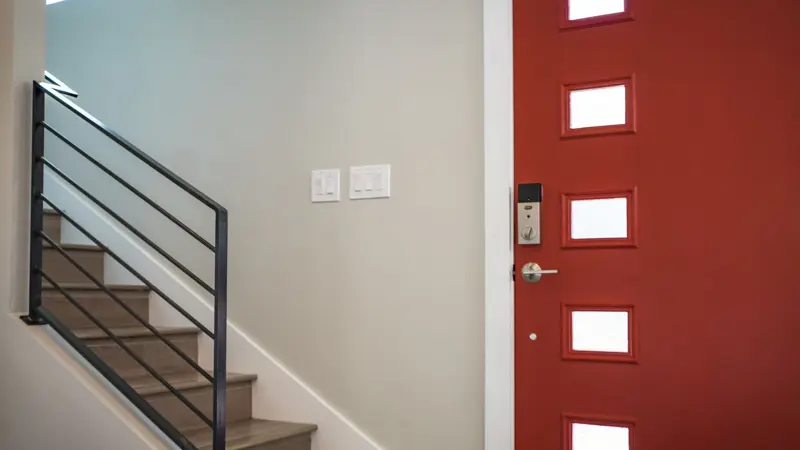Properties Used as Short-Term and Holiday Rentals: What You Need to Know

Over the past two years, there has been a dramatic increase in the number of short term let properties in Scotland, with some areas of the country seeing an increase in listings of 80% in the past twelve months alone.
Recently at James Gibb we have received a number of enquiries from home owners who have concerns within their building regarding neighbouring properties being used as holiday lets on the likes of Airbnb and Booking.com, amongst many others.
The biggest concerns of owners have been regarding the fixture of key safes to the communal walls at the entrance to the buildings, leaving security entry doors open, as well as additional noise and movement during unsociable hours. Understandably, these concerns are justifiable, however we as property factors must outline where our responsibilities lie in ensuring the communal areas of buildings are kept safe, secure and well maintained.
Our Responsibilities as a Factor
As property factors, our role is in the management of communal areas, including lifts, stairwells, corridors and gardens to name just a few aspects. It’s our job to maintain and manage elements and features in the areas such as windows, doors, security systems, gutters, lawns and flowerbeds.
In the instance of short term rentals adapting communal areas to suit their needs, we can simply ask for a key safe that an owner has fitted to the communal entrance to be removed. We can also, if required, encourage visitors to keep the communal door entrance as secure as possible by providing a notice to remind people to close the building door behind them when they leave. We have no authority to take action within individual properties themselves, as we specifically manage the communal areas, meaning that the issues created by short-term rentals often need to be handled directly by the owner.
There are a few options for home owners/occupiers that can help them solve any issues they feel have arisen due to properties being used for short term rentals.
-
Contact the owner of the property that is being let out
Concerned neighbours should make an attempt to contact the owner of the property that is being rented out to highlight the problem their short-term tenants are causing. Some owners may not actually be aware of the problems, so personally informing them may be an effective and quick way to address the issue. They could potentially create stricter rules and make guests more aware of property etiquette. If the contact details of the owner are not known, then your property factor can be contacted and asked to pass on your concerns to them, on your behalf.
-
Check the property’s Title Deeds
Neighbours can also check the title deeds of their property by asking their solicitor or property factor. Some Title Deeds will state the type of habitation which is allowed, and if they are not designed to allow short term lets such as Airbnb, this could result in neighbours taking legal action against the owner of the short term let.
-
Check the Registers of Scotland
Registers of Scotland can show details of the mortgage lender and flag to them that the property is being used as a short-term holiday rental. If a standard buy-to-let property mortgage does now allow short-term rentals, the owner may need a special holiday letting mortgage, otherwise they could be breaching the terms of their current mortgage.

Some Scottish councils have indeed picked up on the issues of short-term rentals and are trying to address them. In March 2017, Glasgow City Council announced new regulations regarding short-term holiday rentals, making it illegal for homeowners in tenement buildings or apartment blocks to rent out their entire property as a short-term holiday let if it has a shared entrance. This is a complaint led system, which is dependent on owners making Glasgow City Council aware of their concerns and detailing the issues to them.
Glasgow City Council is now in the process of introducing planning permission to short-term holiday lets. Guidelines have already been published stating that flats should require planning consent for a “material change of use” if being used as a holiday let due to their communal facilities. The “Material Change of Use Bill” is now in its third stage of discussions in Parliament.
Edinburgh has not followed Glasgow’s changes, however. Edinburgh Council’s guidelines state that whether anyone can rent out their property as a “short-term commercial visitor accommodation” depends on how often it’s used, noise issues, disturbance and parking demand. Instead, Edinburgh City Council launched a task force in 2018 to come up with a solution to complaints regarding short-term holiday rentals.
If you require further information on our responsibilities as property factors, do not hesitate to get in contact with the relevant office using the contact details below.
Glasgow
- 0141 552 2230
- glasgow@jamesgibb.co.uk
Edinburgh
- 0131 229 3481
- edinburgh@jamesgibb.co.uk
Aberdeen
- 01224 650 600
- aberdeen@jamesgibb.co.uk


